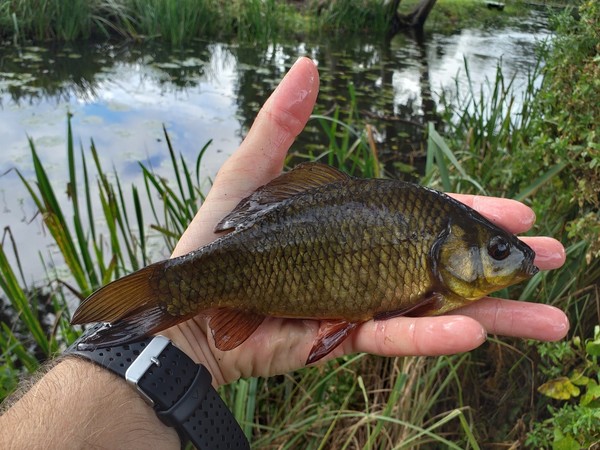At the beginning of May, fifty young individuals of the critically endangered crucian carp were stocked by experts in a pond on the campus of the Faculty of Science of Palacký University in Olomouc-Holice. The Biology Centre of the Czech Academy of Sciences (CAS) is also involved in the project, which is to help strengthen the currently dying population of this fish. The local genetically-pure crucian carp line for the biotope in Olomouc-Holice was provided by the project ambassador, Zdeněk Suchý of Olomouc, and Jan Augustynek, a student of the Faculty of Science.
The crucian carp (Carassius carassius) was one of the most common domestic fish species, formerly abundant in village ponds, oxbows, and pools near rivers. Due to its resistance, it often remained the only species in stagnant water with a lack of oxygen, in choked reservoirs, or pools.
“The carp is a master of survival in inhospitable conditions, in which other fish species are already dying. It can switch to anaerobic, i.e. oxygen-free metabolism in the long run. Thanks to this, it survives even in muddy ponds covered with ice and snow, where oxygen dissipates quickly and for a long time,” said Marek Šmejkal from the Biology Centre of the Czech Academy of Sciences.
In recent years, however, strong competition has emerged in ponds and pools for the original crucian carp. The silver Prussian carp was introduced into domestic waters, which, due to its similar resistance and ability to reproduce by means of gynogenesis (a form of asexual reproduction), was able to completely displace the common crucian carp from its habitats. Many other species of animals, such as amphibians, have been affected in the same way.
The general public can also take part in the project aimed at finding the last populations of the critically endangered crucian carp on the website www.zachrankarase.cz, thus helping to discover new habitats. The selected genetically suitable populations will then be used to establish similar rescue farms as are being established on the premises of the Faculty of Science in Olomouc-Holice.
The project is taking place under the auspices of the Dean of the Faculty of Science, doc. RNDr. Martin Kubala, Ph.D.; guarantor of the field of hydrobiology, doc. RNDr. Martin Rulík, Ph.D.; RNDr. Marek Šmejkal, Ph.D. from the Biology Centre of the CAS and students of hydrobiology.
